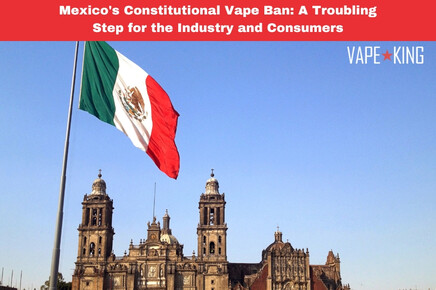Mexico's Constitutional Vape Ban: A Global First with Lasting Implications

Mexico is on the brink of making history—though not in a way to be celebrated. It stands poised to become the only country in the world to enshrine a vape ban in its constitution. This unprecedented move, as grave as it sounds, will cement the prohibition and make reversing it nearly impossible in the future.
A Near-Irreversible Decision
Last week, the Chamber of Deputies—the lower house of Mexico’s federal Congress—passed the bill with a staggering majority of 410 to 24. The proposed amendment bans the sale of vapes but not their use or possession. This week, the Senate is expected to ratify the measure with the required two-thirds majority vote. Beyond federal approval, the amendment must also pass in two-thirds of Mexico’s 32 state legislatures to formally alter Article 4 of the Mexican Constitution, which guarantees the right to health.
This constitutional change will not only entrench the ban but also raise nearly insurmountable barriers to its reversal. Future efforts to repeal the prohibition would demand political support as strong as the current supermajority held by the Morena party—an almost insurmountable task.
A Leader’s Fixation
The vaping ban was initially championed by former President Andrés Manuel López Obrador, who seemed fixated on eliminating vaping throughout his tenure. Before leaving office earlier this year, López Obrador used presidential decrees to prohibit the import and sale of vapes. While these decrees faced court challenges and could have been overturned, the proposed constitutional amendment offers a far more resilient tool for prohibition.
Claudia Sheinbaum, López Obrador’s successor and a Morena party ally, has vowed to carry forward her predecessor’s initiatives, including this constitutional ban. With the current Morena dominance in Congress and state legislatures, López Obrador’s vaping obsession has found fertile ground to become permanent law.
Unintended Consequences
This somber milestone carries consequences that cannot be ignored. Despite existing bans, nearly two million Mexicans vape, sustained by a thriving black market. Experts fear that pushing the legal vape market further underground will play directly into the hands of Mexico’s infamous and violent drug cartels. These organized crime syndicates already control much of the country’s illicit trade, and a government-sanctioned vape ban will likely hand them another lucrative opportunity.
Meanwhile, cigarette sales remain untouched. With 16.5 million smokers—approximately 18% of Mexico’s adult population—cigarettes are still legally sold, creating a paradoxical public health policy. Instead of transitioning smokers to potentially less harmful alternatives, the government appears to be doubling down on maintaining the status quo.
A Sobering Future
Mexico’s constitutional vape ban reflects a disturbing trend of eroding personal choice under the guise of health protections. While the country grapples with profound challenges like organized crime and public health crises, this drastic measure feels alarmingly misplaced.
As we await the Senate’s vote and the subsequent actions of state legislatures, one cannot help but wonder whether this is truly a step forward or a step into deeper uncertainty.
This article will be updated following the Senate vote.
No posts found
Write a review


